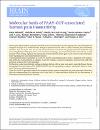Molecular basis of FAAH-OUT-associated human pain insensitivity.

عرض / فتح
التاريخ
2023-05-24المؤلف
Mikaeili, HajarHabib, Abdella M
Yeung, Charlix Wai-Lok
Santana-Varela, Sonia
Luiz, Ana P
Panteleeva, Kseniia
Zuberi, Sana
Athanasiou-Fragkouli, Alkyoni
Houlden, Henry
Wood, John N
Okorokov, Andrei L
Cox, James J
...show more authors ...show less authors
البيانات الوصفية
عرض كامل للتسجيلةالملخص
Chronic pain affects millions of people worldwide and new treatments are needed urgently. One way to identify novel analgesic strategies is to understand the biological dysfunctions that lead to human inherited pain insensitivity disorders. Here we report how the recently discovered brain and dorsal root ganglia-expressed FAAH-OUT long non-coding RNA (lncRNA) gene, which was found from studying a pain-insensitive patient with reduced anxiety and fast wound healing, regulates the adjacent key endocannabinoid system gene FAAH, which encodes the anandamide-degrading fatty acid amide hydrolase enzyme. We demonstrate that the disruption in FAAH-OUT lncRNA transcription leads to DNMT1-dependent DNA methylation within the FAAH promoter. In addition, FAAH-OUT contains a conserved regulatory element, FAAH-AMP, that acts as an enhancer for FAAH expression. Furthermore, using transcriptomic analyses in patient-derived cells we have uncovered a network of genes that are dysregulated from disruption of the FAAH-FAAH-OUT axis, thus providing a coherent mechanistic basis to understand the human phenotype observed. Given that FAAH is a potential target for the treatment of pain, anxiety, depression and other neurological disorders, this new understanding of the regulatory role of the FAAH-OUT gene provides a platform for the development of future gene and small molecule therapies.
المجموعات
- أبحاث الطب [1913 items ]

